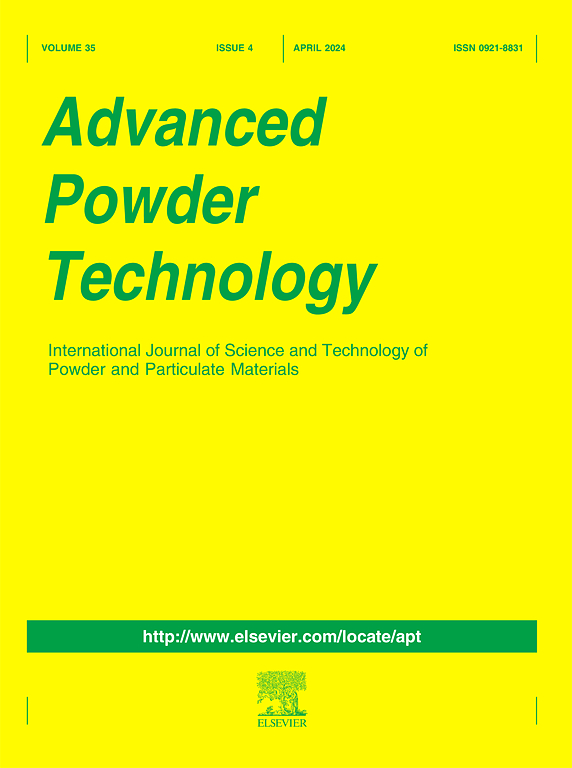Optimization of conventional-zeolite-synthesis from waste pumice for water adsorption
IF 4.2
2区 工程技术
Q2 ENGINEERING, CHEMICAL
引用次数: 0
Abstract
This research reports conventionally-synthesized-zeolites with comparatively large surface area (SSA) and water-uptake prepared solely from waste-pumice. Notably, the synthesis process avoided using additional commercial raw materials, organic templates, and high temperatures, so that the process was less costly and ecofriendly. To optimize the process, the synthesis time was varied, and the mixture of the raw material and alkaline solution was stirred for 12 h. The zeolite mother liquor was also recycled. Water adsorption experiments were carried out using gravimetric measurements. The Na-P1-rich zeolite product with an optimal water uptake of 0.256 g/g was synthesized after 48 h of hydrothermal activation (H). On the other hand, the product’s optimal SSA of 186 m2/g was achieved after 36H under similar conditions (rich in faujasite). Adsorption isotherms showed that water uptake increased with activation time and with the inclusion of mother liquor recycling. Furthermore, recycling resulted in a product with enhanced SSA compared to its precursor. Un-recycled products exhibited relatively high-water uptake both at low and high relative-pressure, while the recycled product had a high uptake at high relative pressure. All products could be used in adsorption heat pump (AHP) applications (air conditioning) suited for high relative humidity (RH) environments. However, high-synthesis-time non-recycled products could also work for low RH AHP applications.

优化利用废浮石合成用于吸附水的传统沸石的工艺
这项研究报告了完全利用废浮石制备的具有相对较大表面积(SSA)和吸水性的传统合成沸石。值得注意的是,该合成过程避免了使用额外的商业原料、有机模板和高温,因此成本较低且环保。为优化工艺,改变了合成时间,并将原料和碱性溶液的混合物搅拌 12 小时。利用重量测量法进行了水吸附实验。水热活化(H)48 小时后,合成了富含 Na-P1 的沸石产品,其最佳吸水率为 0.256 g/g。另一方面,在类似条件下(富含 faujasite),经过 36 小时后,产品的最佳 SSA 值为 186 m2/g。吸附等温线表明,吸水率随活化时间和母液循环的加入而增加。此外,与前驱体相比,回收后的产品具有更高的 SSA。在低压和高压相对压力下,未回收产品的吸水率都相对较高,而回收产品在高压相对压力下的吸水率较高。所有产品都可用于适合高相对湿度(RH)环境的吸附热泵(AHP)应用(空调)。不过,高合成时间的非再循环产品也可用于低相对湿度的 AHP 应用。
本文章由计算机程序翻译,如有差异,请以英文原文为准。
求助全文
约1分钟内获得全文
求助全文
来源期刊

Advanced Powder Technology
工程技术-工程:化工
CiteScore
9.50
自引率
7.70%
发文量
424
审稿时长
55 days
期刊介绍:
The aim of Advanced Powder Technology is to meet the demand for an international journal that integrates all aspects of science and technology research on powder and particulate materials. The journal fulfills this purpose by publishing original research papers, rapid communications, reviews, and translated articles by prominent researchers worldwide.
The editorial work of Advanced Powder Technology, which was founded as the International Journal of the Society of Powder Technology, Japan, is now shared by distinguished board members, who operate in a unique framework designed to respond to the increasing global demand for articles on not only powder and particles, but also on various materials produced from them.
Advanced Powder Technology covers various areas, but a discussion of powder and particles is required in articles. Topics include: Production of powder and particulate materials in gases and liquids(nanoparticles, fine ceramics, pharmaceuticals, novel functional materials, etc.); Aerosol and colloidal processing; Powder and particle characterization; Dynamics and phenomena; Calculation and simulation (CFD, DEM, Monte Carlo method, population balance, etc.); Measurement and control of powder processes; Particle modification; Comminution; Powder handling and operations (storage, transport, granulation, separation, fluidization, etc.)
 求助内容:
求助内容: 应助结果提醒方式:
应助结果提醒方式:


